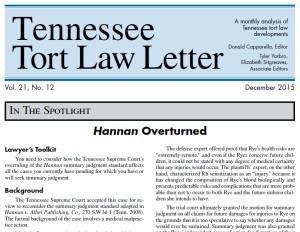Tennessee’s New Summary Judgment Standard: What You Need to Know Now
 In the December 2015 edition of the Tennessee Tort Letter, your editors address the new Tennessee Supreme Court opinion in Rye v. Women’s Care Center of Memphis, establishing a new summary judgment standard.
In the December 2015 edition of the Tennessee Tort Letter, your editors address the new Tennessee Supreme Court opinion in Rye v. Women’s Care Center of Memphis, establishing a new summary judgment standard.
Here is an excerpt from the Tennessee Tort Letter’s commentary on the case:
One question that arises from this overruling of the Hannan standard is how the Rye case affects those cases decided on summary judgment in the interim between the Hannan decision and the Rye decision. The Supreme Court has noted that “[i]n civil cases, judicial decisions overruling prior cases generally are given retrospective effect.” Hill v. City of Germantown, 31 S.W.3d 234, 239 (Tenn. 2000), citing Perez v. McConkey, 872 S.W.2d 897, 906 (Tenn.1994) (applying abolition of assumption of the risk doctrine retroactively); Cook v. Spinnaker’s of Rivergate, Inc., 846 S.W.2d 810, 812 (Tenn.1993) (further describing proper retroactive application of McIntyre); McIntyre v. Balentine, 833 S.W.2d 52, 58 (Tenn.1992) (applying comparative fault doctrine retroactively). The Hill case decided the retroactive application of the case of Jordan v. Baptist Three Rivers Hosp., 984 S.W.2d 593 (Tenn. 1999), ultimately concluding that the rule of Jordan permitting recovery of consortium damages in wrongful death suits should be applied retroactively to “(1) all cases tried or retried after January 25, 1999, the date of our decision in Jordan; and (2) to all cases pending on appeal in which the issue decided in Jordan was raised at an appropriate time.” Hill, 31 S.W.3d at 240.
Retrospective effect of judicial decisions overruling prior cases will be “denied only if such an application would work a hardship upon those who have justifiably relied upon the old precedent.” Marshall v. Marshall, 670 S.W.2d 213, 215 (Tenn. 1984). The Marshall case notes as follows:
“prospective only” application of an overruling decision should be limited to a case where hardship on a party who has relied on the old rule outweighs the hardship on the party denied the benefit of the new rule; and…“Since there are few cases where such rigorous demonstrations can be made, there should be few occasions when prospective overruling can justifiably displace the normal retroactive application of the overruling decision.”
Id., citing 28 Hastings L.J. 533 (1977).
In another Tennessee Supreme Court decision that pre-dates Marshall, the Court observed that the United States Supreme Court had adopted a “posture of non-retroactivity” only where three conditions are present: (1) the decision at issue establishes a new principle of law by overruling clear past precedent; (2) retroactive application will retard its prospective application; and (3) retroactive application could produce substantial inequitable results to instant litigants. Luna v. Clayton, 655 S.W.2d 893 (Tenn. 1983).
The Court’s Rye opinion does not explicitly state one way or the other whether its application should be prospective, retrospective, or, as some opinions announce, apply to those actions pending on or after the date that the Rye decision became final. The opinion does, however, make a slight nod to the issue in a footnote. In response to the Rye plaintiffs’ argument that this holding amounts to a retroactive application of Tenn. Code Ann. § 20-16-101 (the 2011 statute codifying the Celotex summary judgment standard), the Court states: “Our decision overruling the manner in which Hannan interpreted Tennessee Rule 56 amounts instead to a proper exercise of our authority to reconsider, and when appropriate, abandon rules of law previously articulated in judicial decisions. In civil cases, judicial decisions overruling prior cases generally are applied retrospectively.” Rye, No. W2013-00804-SC-R11-CV, — S.W.3d — at fn. 9, (Tenn. Oct. 26, 2015), citing Hill v. City of Germantown, 31 S.W.3d 234, 239 (Tenn. 2000) (emphasis in original).
…
The Tennessee Tort Law Letter provides attorneys across the state timely analysis and detailed insight into developments in Tennessee law. To learn about subscribing, click here.
DPBC attorney’s Donald Capparella, Tyler Chance Yarbro, and Elizabeth Sitgreaves serve as editors of the Tennessee Tort Letter.





